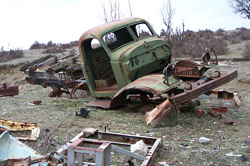Armenians mainly blame the presidents of Azerbaijan and Armenia, as well as the political elite of each country for the failure of the Karabagh conflict negotiations in Rambulle, but in reality there are other reasons. However, this doesn’t mean that the “elite” of each country is not hindering the negotiations process. They are hindering it and it’s out in the open. Negotiator countries are acting rather indifferently towards the issue and that’s not normal.
If the conflicting sides can’t establish peace through negotiations once and for all, then maybe it’s time that they start negotiating peacefully. Of course, an average journalist can turn the words around just like I did, but it’s hard for presidents to take things and turn them around and forget about the laws and not stick to their beliefs. It’s just a matter of will.
Since I started the topic, I will first give some advice to the negotiator countries: in order to establish peace, you must strive for it. You have to go for the goal. Before placing resolution packets on the table, they have to deal with the issue of peace. Basically, they have to say to the ministers or highly respected presidents that, before carrying out the mission of making visits to the country for “peace” meetings, please take the time to sign a declaration stating that as presidents, you obligate yourself to resolve the conflict through peaceful negotiations.
So, the first step is to instill the will to solve matters peacefully. The declaration signed by the two sides, or five (the two presidents and the three co-chairmen of the Minsk Group) will bring up a set of requirements and they will be included in the declaration. Both sides must swear to stop the racism and war propaganda.
This is the first requirement, but it’s not the whole thing because stopping the anti-national and war propaganda doesn’t mean preparing the people for peace. Both sides must take on the responsibility of being optimistic about the future and pass that optimism on to the people. I am not saying propagandizing a peace-loving nation because you never know when that will lead to propaganda on war and racism. The leaders of both countries must do their best to heal the wounds remaining from the war and get the people’s dignity back.
The third step is to encourage dialogues between both nations. It’s not about one side coming out victorious, or exceeding the other with its military budget. This doesn’t alleviate the situation, but rather, makes it tougher.
The fourth step is to have the people of each country communicate with one another. Is it really impossible, for example, to organize field trips to the birthplaces of the Armenians living in Azerbaijan and the Azerbaijani in Ijevan, or visiting the cemeteries, reunions with old relatives and neighbors? If there is will and desire, then it turns out that techniques are the only issues.
The fifth and most important step is to reuse natural resources and joint communication technologies. How can there be peace when one side deserts the lands and fields of the other (the lands and fields which were used by both sides at a time) and keeps them as marksmen? How can there be peace when one side simply shuts down the flow of irrigation of the other country?
The abovementioned steps will in a way get rid of the hatred between the two and it’s clear to both societies that that hatred exists. Then we will see if the presidents claim that the people are not ready for establishment of peace.
Let’s not forget that you have to use water to put out a fire, just like in this case to solve the conflict. This is just basic knowledge, but the negotiating sides are trying to put out the fire of the conflict with benzene and kerosene. Whenever an Armenian soldier dies in Ijevan or Tovuz after being shot from the other side, Armenian press immediately takes advantage and declares the invisible as the enemy. Meanwhile, they could take the time to ask themselves and the societies the following question: “How many more Rambulle, Key West and other similar legerdemain meetings must take place in order to prevent the death of a 20 year old soldier keeping eye on the border?” This is one question that hasn’t been answered for the past twelve years.

